War to End War (2)
(Chronological listing of WW I events commencing with general period overviews)
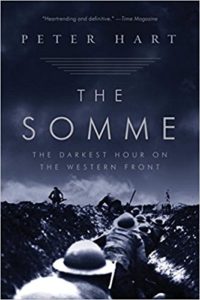 The Somme: Darkest Hour on the Western Front, by Peter Hart (2009 - 624 pp)
The Somme: Darkest Hour on the Western Front, by Peter Hart (2009 - 624 pp)
Emotionally charged, intense work on 'The Somme', a synonym for the cruelty of war. Over 1 million fell in this largely indecisive, massive battle. A great read.
 All Quiet on the Western Front, by Erich Maria Remarque (1928 - 224 pp)
All Quiet on the Western Front, by Erich Maria Remarque (1928 - 224 pp)
This powerfully told 1928 novel by a German WW I veteran moves from one memorable scene to another describing the extreme mental stress of war on the front lines.
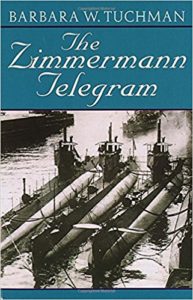 The Zimmerman Telegram, by Barbara Tuchman (1985 - 256 pp)
The Zimmerman Telegram, by Barbara Tuchman (1985 - 256 pp)
Great writing by Tuchman about the German proposal for Mexico to declare war on the U.S in exchange for Texas, New Mexico and Arizona.
 The General and the Jaguar, by Eileen Welsome (2007 - 432 pp)
The General and the Jaguar, by Eileen Welsome (2007 - 432 pp)
Intriguing, well told story of Pershing's incursion into Mexico with 5000 troops to catch bandit Pancho Villa before leading the AEF in WW II.
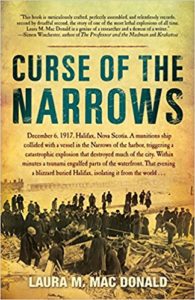 Curse of the Narrows, by Laura MacDonald (2006 - 372pp)
Curse of the Narrows, by Laura MacDonald (2006 - 372pp)
Highly compelling tale of the Halifax disaster, the largest man made explosion before the atomic bomb, caused by an exploding ammunition ship.
 Chateau Thierry and Belau Wood, by Davic Bonk (2007 - 196pp)
Chateau Thierry and Belau Wood, by Davic Bonk (2007 - 196pp)
Heroic telling of the gritty battles of the first American's to fight. The U.S Marines suffered heavy casualties but helped tip the balance for the Allies.
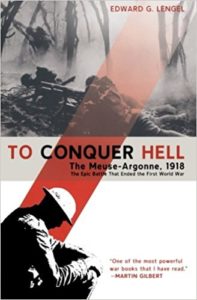 To Conquer Hell: The Meuse Argonne, by Edward Lengel (2009 - 528 pp)
To Conquer Hell: The Meuse Argonne, by Edward Lengel (2009 - 528 pp)
Extremely readable story of the only major battle the U.S. fought and the tragic price (120,000 casualties) for Pershing's old-school frontal assault tactics.
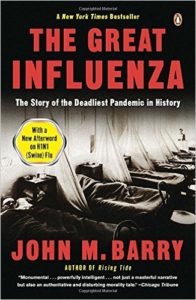 The Great Influenza, by John Barry (2005- 546 pp)
The Great Influenza, by John Barry (2005- 546 pp)
The Great Influenza of 1918 killed 30-50 million (3% of the world's population), mostly young adults, making it the deadliest natural disaster in human history.
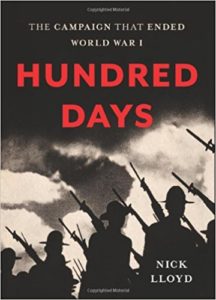 Hundred Days, by Nick Lloyd (2014 - 400 pp)
Hundred Days, by Nick Lloyd (2014 - 400 pp)
Amazingly readable and one of the few great books on the war's end, the great allied offensives, German retreat, the political situation in Germany and Kaiser's abdication.
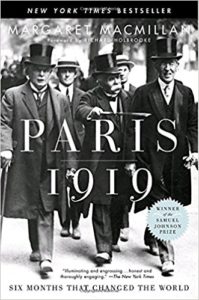 Paris 1919, by Margaret MacMillan (2003 - 624 pp)
Paris 1919, by Margaret MacMillan (2003 - 624 pp)
Totally fascinating account of the final German capitulation, how the Allies carved up the world at Versailles and the seeds laid for WW II.
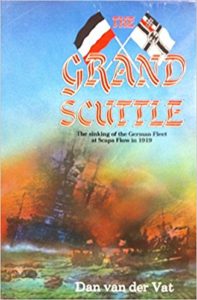 The Grand Scuttle: The Sinking of the German Fleet at Scapa Flow,
The Grand Scuttle: The Sinking of the German Fleet at Scapa Flow,
by Dan van der Vat (2002 - 320 pp)
Historic 1919 scuttling of the German Fleet and over 50 of the world's greatest warships at Scapa Flow, Scotland upon the signing of the Treaty of Versailles.
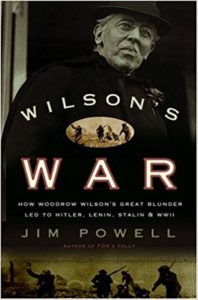 Wilson's War: The Blunder that Led to WW II by Jim Powell (2005 - 352 pp)
Wilson's War: The Blunder that Led to WW II by Jim Powell (2005 - 352 pp)
Revisionist, but plausible notion that U.S. entry into WW I prevented a general armistice of European powers, led to Versailles and made WW II inevitable.
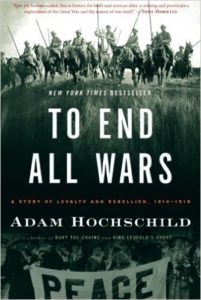 To End All Wars, by Adam Hochschild (2012 - 496pp)
To End All Wars, by Adam Hochschild (2012 - 496pp)
A poignant look at the appalling cost of WW I, the many who tragically supported it...and the few who sacrificed their reputations and freedom to oppose it.
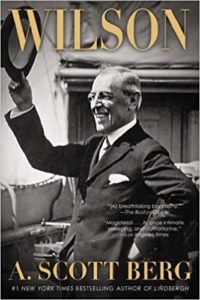 Wilson, by A. Scott Berg (2013, Sep - 832pp)
Wilson, by A. Scott Berg (2013, Sep - 832pp)
Spectacular, easy to read new bio of Wilson, the idealist at the crossroads of history during WW I, the Treaty of Versailles and failure of the League of Nations.
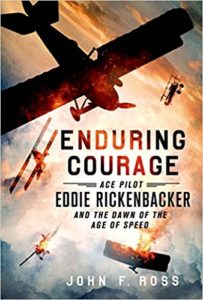 Enduring Courage: Ace Pilot Eddie Rickenbacker, by John F Ross
Enduring Courage: Ace Pilot Eddie Rickenbacker, by John F Ross
(2014, May - 400 pp)
Lively account of WW I flying ace Eddie Rickenbacker who battled the Red Baron, had 26 aerial victories of his own, drove race cars and was a true American hero.
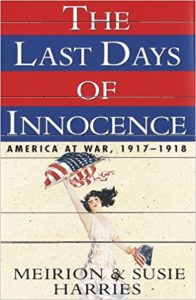 The Last Days of Innocence, by Marion & Susie Harries (1997 - 573 pp)
The Last Days of Innocence, by Marion & Susie Harries (1997 - 573 pp)
A new, less romanticized look at the participation of the U.S. in WW I and the unfortunate plight of disillusioned troops returning home after a war that many allege was unnecessary for us.
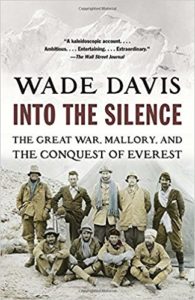 Into the Silence: The Great War, Mallory and Mt Everest, by Wade Davis
Into the Silence: The Great War, Mallory and Mt Everest, by Wade Davis
(2012 - 688pp)
Fascinating account of Mallory's epic 1924 attempt to be the first to climb Everest. Great context with WW I and the front line experience that shaped so many.
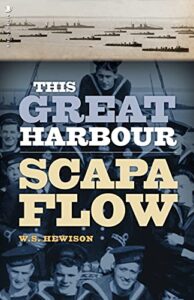 This Great Harbor: Scapa Flow, by W.S, Hewison (1986 - 348 pp)
This Great Harbor: Scapa Flow, by W.S, Hewison (1986 - 348 pp)
Known by mariners since Viking times as a safe anchorage in notoriously savage waters, Scapa Flow is the seaway that runs between the Orkney mainland and the island of Hoy. As the northern base of the Royal Navy and Allied fleets in two world wars, it witnessed some of the most seminal events in modern naval history.
Click here to continue to Before the War
